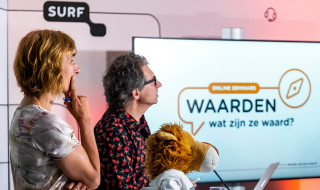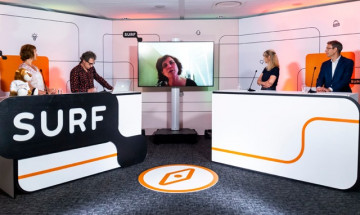With a series of seven online seminars for board members in education and research, SURF is initiating the discussion about how we as a sector can join forces to protect public values in IT. We look back at the seminar series with some of the board members present in 3 SURF Magazine articles.
Review of the seminar series on public values - part II
'Europe should not let the digital revolution happen, but shape it itself' - With TU Delft board member Rob Mudde we look back on part 2 of the seminar series.

Rob Mudde, Vice Rector Magnificus of TU Delft
We have seen the infancy, but we are not even in it yet'. The statement was made during the seminar on the data revolution, which is still mainly taking place outside the world of education. It came from Rob Mudde, Vice Rector Magnificus of Delft University of Technology (TU Delft). Looking back on the online seminar, he has another one-liner up his sleeve: 'It is incredibly early to have to say anything about the digital transformation - like seeing the first assembly line and thinking you know how the car industry will develop'.
Education has only a few years left before it is too late to exert sufficient influence on the tech companies.
By this, he does not mean that the subject is not relevant, or that there is still enough time to start the conversation. On the contrary, Mudde expects that higher education has only a few years left before it is too late to exert sufficient influence on the tech companies. 'There are a number of fundamental values that we need to guard very carefully, to prevent them from being eroded slowly but surely. The industrial revolution has brought many good things, except to the people who first encountered it. They ended up in poverty and misery. Because we know that, we must now be very careful what we do.'

Revolutionary technology
Back to the problem. The second part of the seminar series for board members dealt with two far-reaching technological developments: the content revolution and the data revolution. The content revolution is characterised by the major impact of digitisation on the distribution, content and accessibility of information. During this seminar, two exponents of that revolution were discussed: the open online encyclopaedia Wikipedia and publisher Elsevier, a company that uses digital developments to make learning materials more attractive and smarter.
We call it the content revolution, but what is really revolutionary is the underlying technology," says Rob Mudde. With publishers' systems, you can offer your education easier and better. The disadvantage is that you cannot leave them after three years, because you are dependent for your education on the online assignments and the automatic feedback of those systems. How are we going to ensure that an interoperable system is created in which we can benefit from the innovative power of tech companies but in which we can also pick up our stuff and move on to the next provider?
With publishers' systems, you can offer your education easier and better. The disadvantage is that after three years you can't leave.
Monitoring student welfare
The unhealthy grip of tech companies on education is the common thread in the discussion about public values. It is also a reason why higher education is wary of the data revolution. During the fifth seminar, Ron Roozendaal of the Ministry of Health, Welfare and Sport and Bert Verdonck of Philips explained how data are already improving the quality of care. For example, the quality of life of many patients is improved by remote preventive monitoring of their health. At first sight, the use of data also seems promising for education. Insights from data can optimise the curriculum or teaching materials, or serve for self-reflection or evaluation. In the same way that health care services preventively monitor patients, higher education can use data to keep track of student welfare. But then the question soon arises as to whose data is it. The person to whom it belongs? Or of the person who stores them? How can you ever get that data out of there? And if you can't, should you let American providers collect them?

In the studio during one of the seminars
During the seminar on the data revolution, it was noted that education is characterised by inviting people to make mistakes. Learning is done by trial and error. Mudde: 'If every student is recorded on how many times he or she has fallen and we can no longer erase the data, then I seriously wonder whether we should want that. Does the higher education sector still want to use the advantages of study data? Then please work together and under conditions. During the seminar, a number of proposals for collaboration already came to light: making clear promises, creating a uniform language, collaborating within an experiment and setting up an AVG desk.
Clash of cultures
Rob Mudde is convinced that the institutions themselves must take control. We are suffering from being outplayed by tech companies. We will have to present a united front and make demands. As far as he is concerned, that is a European task. In America, something only has value when you can put a price tag on it. In the East it has value if it serves the greater good, read: the party. Here in Europe, values can be intrinsic, such as freedom and accessibility. It is just that this does not translate as easily into targeted actions, also because Europe is not one country.
In Europe, we consider initial education a public good. It would be best to arrange it privately, but that would tear society apart. That is not right.'
But Europe is not going to make it with legislation and regulation alone, he warns. The really big tech companies, like Amazon and Google, don't listen to Europe very much. This is understandable, because their intrinsic values stem from a different culture. We regard education, especially initial education, as a public good. It is also possible to regulate it privately, but that would tear society apart. It is not right. It shouldn't matter to a child where its cradle was.
European edX
How cultures can clash is again evident now that the American open education platform edX may be taken over by commercial parties. TU Delft, one of the first participants in edX, is keeping a close eye on how the takeover will turn out. We want to help learners all over the world at cost price," says Mudde. That is a principle that edX set great store by. If that changes, we will be scratching our heads. He concludes that Europe should start working on its own edX. Every European country is thinking about lifelong development (LLO). You need an infrastructure for this, driven by public values. The Netherlands can take the lead.

The need for a separate infrastructure for learning resources is a conclusion that was widely shared in the session on the content revolution. Sandra Rientjes, Director of Wikimedia Netherlands, described the power of wisdom of the crowd to produce high-quality information. Michiel Kolman, Senior Vice President Information Industry Relations at Elsevier, emphasised the need for cooperation between educational institutions and publishers in order to continue offering quality education.
The need for a separate infrastructure for learning resources is a conclusion that was widely shared in the session on the content revolution. Sandra Rientjes, Director of Wikimedia Netherlands, described the power of wisdom of the crowd to produce high-quality information. Michiel Kolman, Senior Vice President Information Industry Relations at Elsevier, emphasised the need for cooperation between educational institutions and publishers in order to continue offering quality education.
Mudde likes to make a comparison with the European road network. Whether you want to drive on it in an ugly duckling, a truck or a luxury car is up to you. But we maintain it together. In other words: let Google offer a course in programming via the infrastructure, but for a module in Sanskrit, you will have to go to higher education. The content revolution and the data revolution offer a wide range of possibilities for giving European higher education a significant boost. No one needs to be a victim of the digital revolution.
Text: Marjolein van Trigt
Photos: Beeldredaktie
Translation: Deepl
About the seminar series
The corona crisis is increasing the role of digitisation in education and with it our dependence on dominant market parties. Reason enough for SURF to organise a series of seven online seminars about protecting public values. Under the guidance of journalist and moderator Frénk van der Linden and philosopher Marjan Slob, board members will enter into discussion with one another. The series consists of 3 parts, of which part I and II have been completed.
- Part I consisted of three meetings that together explored the emergence of tension between cultural, private and public values in the process of digitisation.
- Part II of the seminar series, which is the subject of this article, was about public values and IT in the context of education and research.
- In Part III, we explore how we can secure shared values in IT. We will share the conclusions from these sessions in the third article.
'Review of the seminar series on public values - part II' is an article from SURF Magazine. Monthly the newest articles in your inbox? Then subscribe to the SURF Magazine newsletter (in Dutch).
Questions about this article? Mail to magazine@surf.nl
